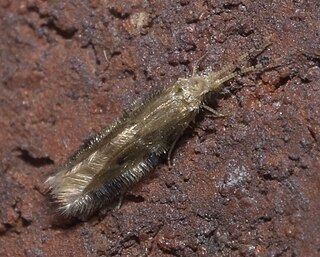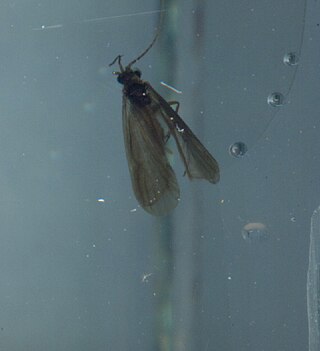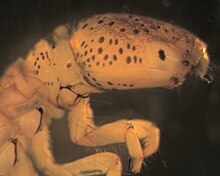
The family Leptoceridae are a family of caddisflies often called "long-horned caddisflies". Leptoceridae is the second largest family of caddisflies with more than 1500 species in around 45 genera. The main identifying feature of most Leptoceridae is that their antennae are longer than those of other caddisflies. There is one genus with short antennae (Ceraclea), but it is easily identified by the pair of dark curved lines on the mesonotum.

The Hydroptilidae are a large family of caddisflies (Trichoptera) with a worldwide distribution. They are commonly known as microcaddisflies or purse-case caddisflies, in reference to two characteristic traits of this family: Hydroptilidae are much smaller than other caddisflies, rarely exceeding 5 mm (0.20 in) in length. Their larvae do not build a protective case until the final instar of their growth. At that time however, they build a typically Purse-shaped case, either portable or stuck to the substrate, in which the larva finishes growth and pupates.

The Psychomyiidae are a family of tube-making caddisflies. Members of this family are typically very similar to polycentropodids, most of them can be differentiated by the spur formula is 2-4-4, thyridial cell short, absence of the forewing fork I, and hindwing forks I and IV. Male genitalia has elongate preanal appendages, and reduced tergum IX. The larvae differ by the submental sclerites separated, foretrochantin broad, and the pupal mandible apex whip-like. Larvae construct long silken galleries.

Brachycentridae is a family of humpless casemaker caddisflies in the order Trichoptera. It is found in North America, Europe, and Asia. Georg Ulmer first described it in Germany in 1903 as a subfamily of Sericostomatidae. The type genus for Brachycentridae is Brachycentrus J. Curtis, 1834.

Limnephilini is a tribe of northern caddisflies in the family Limnephilidae. There are about 16 genera and at least 300 described species in Limnephilini.

Mystacides is a genus of long-horned caddisflies in the family Leptoceridae. There are more than 20 described species in Mystacides.

Agrypnia is a genus of giant caddisflies in the family Phryganeidae. There are about 19 described species in Agrypnia.

Neophylax is a genus of autumn mottled sedges in the family Uenoidae. There are more than 30 described species in Neophylax.

Stenophylacini is a tribe of northern caddisflies in the family Limnephilidae. There are at least 20 genera and 190 described species in Stenophylacini.

Macrostemum is a genus of netspinning caddisflies in the family Hydropsychidae. There are at least 90 described species in Macrostemum.

Limnephilinae is a subfamily of northern caddisflies in the family Limnephilidae. There are at least 65 genera and 600 described species in Limnephilinae.

Chilostigmini is a tribe of northern caddisflies in the family Limnephilidae. There are about 12 genera and at least 40 described species in Chilostigmini.

Dicosmoecinae is a subfamily of northern caddisflies in the family Limnephilidae. There are about 19 genera and at least 80 described species in Dicosmoecinae.

Hydroptilinae is a subfamily of microcaddisflies in the family Hydroptilidae. There are at least 60 genera and 1,600 described species in Hydroptilinae.

Anabolia is a genus of northern caddisflies in the family Limnephilidae. There are about 18 described species in Anabolia.

Lype is a genus of net tube caddisflies in the family Psychomyiidae. There are more than 20 described species in Lype.

Anisocentropus is a genus of caddisflies in the family Calamoceratidae. There are more than 60 described species in Anisocentropus.

Molanna is a genus of hood casemakers in the family Molannidae. There are more than 20 described species in Molanna.

Holocentropus is a genus of tube maker caddisflies in the family Polycentropodidae. There are more than 40 described species in Holocentropus.



















